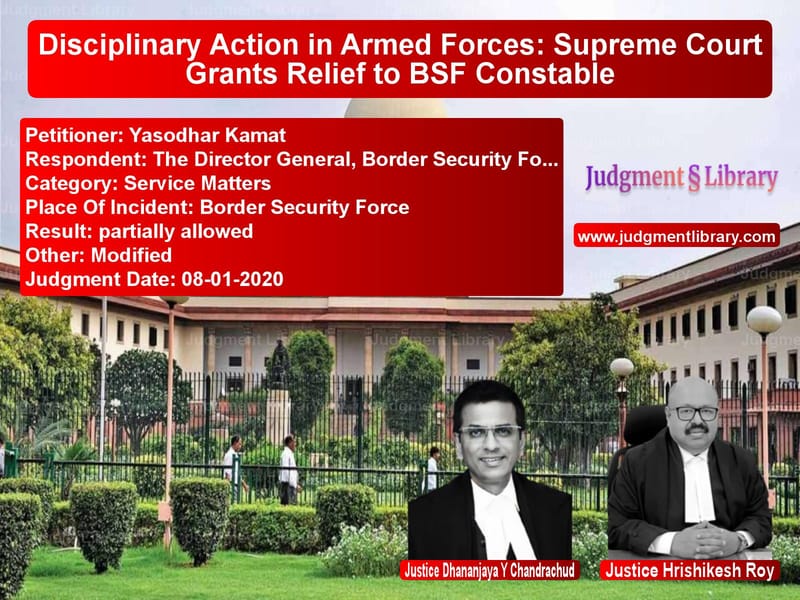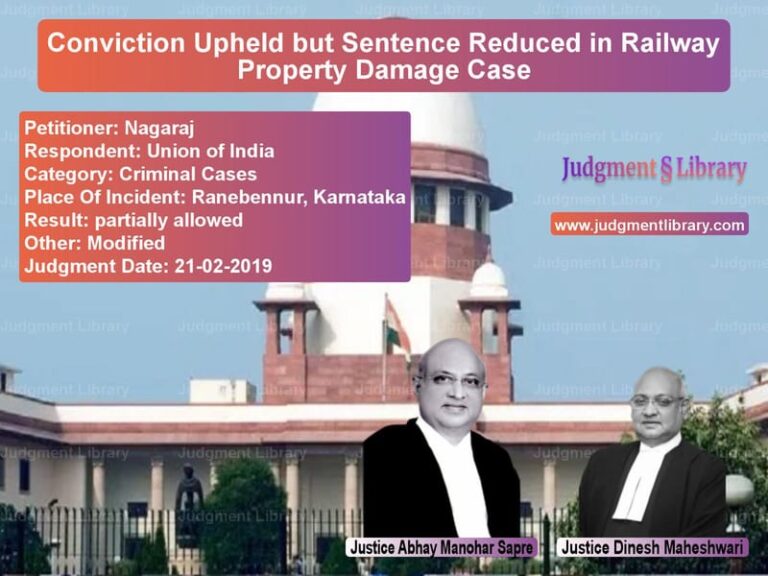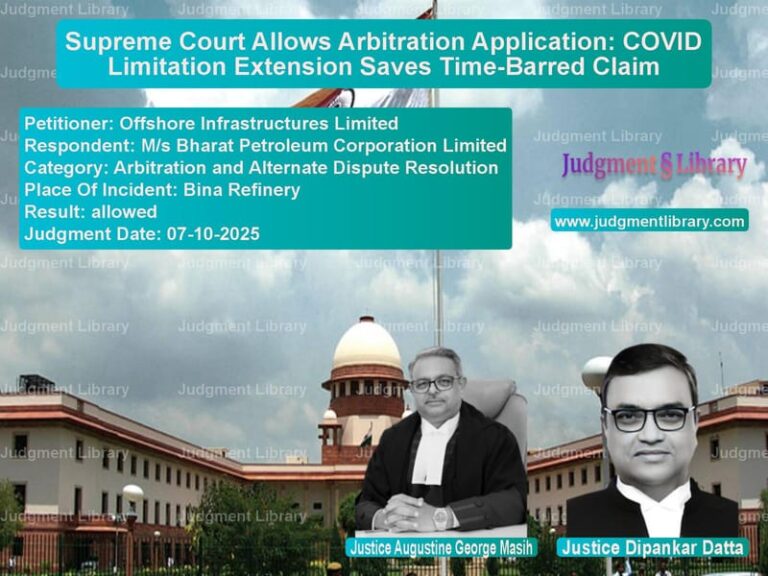Disciplinary Action in Armed Forces: Supreme Court Grants Relief to BSF Constable
The case of Yasodhar Kamat vs. The Director General, Border Security Force & Ors. revolved around the dismissal of a BSF constable for unauthorized absence and the Supreme Court’s intervention in determining the proportionality of punishment. The Court examined whether the dismissal was excessive and whether an alternative penalty could be imposed to safeguard the appellant’s pension rights.
The appellant, Yasodhar Kamat, had served in the Border Security Force (BSF) for 17 years when he was dismissed from service due to unauthorized absence beyond the period of sanctioned leave. The dispute originated from an incident in 2007 when he failed to report back on time due to a family emergency.
Background of the Case
Yasodhar Kamat, a BSF constable, had applied for leave from February 10, 2007, to March 1, 2007. However, he rejoined duty on April 4, 2007, a delay of over a month. Due to this, he was charged under Section 19(b) of the BSF Act, 1968, which pertains to misconduct related to unauthorized absence. Following a Summary Security Force Court (SSFC) inquiry, he was dismissed from service.
The appellant’s statutory petition for reconsideration of the dismissal was rejected by the Director General, BSF, on June 13, 2007. He then approached the Patna High Court under Article 226 of the Constitution. The High Court’s Single Judge set aside the dismissal and directed a reconsideration of the penalty, ruling that the punishment was excessive. However, a Division Bench of the High Court overturned this decision, reinstating the dismissal.
Arguments by the Petitioner
The petitioner, Yasodhar Kamat, argued that his absence was due to a compelling family emergency. His niece had been kidnapped, and he had to extend his leave to search for her. He had informed his unit adjutant about the situation and sought leave extension.
“I was granted 15 days CL w.e.f. 10-02-07 to 1-3-07 due to my niece kidnapping. However, I had requested my Offg Coy Comdr to grant 30 days EL. But I was granted 15 days CL only.”
He further explained:
“I had given information about the kidnapping of my niece to Unit Adjutant Shri V S Shekhawat Dy Comdt on Mobile on 25, 26 Apr 07 and requested him for extension of leave.”
The petitioner contended that he had not willfully overstayed his leave and had sought an extension following proper procedure.
Arguments by the Respondents
The BSF argued that as a member of a disciplined force, the petitioner’s conduct was unacceptable. They asserted that:
“The appellant had submitted an application for extension of leave belatedly and that as a member of the disciplined force, his conduct could not be condoned.”
The BSF maintained that the punishment of dismissal was justified given the appellant’s past record of unauthorized absences.
Supreme Court’s Observations
The Supreme Court examined whether dismissal was a proportionate punishment in the given circumstances. The Court noted that the appellant had contacted his Unit Adjutant for a leave extension and had provided a valid explanation for his absence.
Justice D.Y. Chandrachud observed:
“The appellant had contacted his Unit Adjutant for extension of leave. The explanation has not been rejected as being either false or incorrect.”
The Court acknowledged that the appellant had a history of previous penalties for unauthorized absence but emphasized that dismissal would deprive him of pension benefits despite serving for 17 years.
Final Judgment
The Supreme Court ruled that the punishment of dismissal was disproportionate and directed that:
- The appellant should be treated as having been discharged from service instead of being dismissed.
- His service tenure should be counted until he completes 20 years of service to qualify for pension.
- He would not be entitled to back wages for the period between his dismissal and the completion of pensionable service.
- The arrears of pension should be paid to him within three months.
The Court concluded:
“Having regard to the fact that the appellant had nearly seventeen years of service, an appropriate view needs to be taken so as to facilitate the appellant being granted pension after completion of twenty years of pensionable service.”
Implications of the Judgment
This judgment sets a precedent regarding disciplinary action in the armed forces, emphasizing that punishments should be proportionate to the offense. While maintaining discipline is crucial, extreme penalties like dismissal should not be imposed without considering mitigating circumstances.
The ruling highlights that:
- Personnel in disciplined forces should be given fair consideration in cases of genuine emergencies.
- Punishment should balance disciplinary needs with fairness, ensuring that penalties are not unduly harsh.
- Dismissal should be reserved for grave offenses, while lesser infractions should allow for alternative penalties.
Conclusion
The Supreme Court’s intervention in this case underscores the necessity of a just and equitable approach to disciplinary actions within the armed forces. The judgment ensures that while discipline is upheld, personnel are not deprived of their rightful entitlements due to overly harsh penalties.
Petitioner Name: Yasodhar Kamat.Respondent Name: The Director General, Border Security Force & Others.Judgment By: Justice Dhananjaya Y Chandrachud, Justice Hrishikesh Roy.Place Of Incident: Border Security Force.Judgment Date: 08-01-2020.
Don’t miss out on the full details! Download the complete judgment in PDF format below and gain valuable insights instantly!
Download Judgment: Yasodhar Kamat vs The Director General Supreme Court of India Judgment Dated 08-01-2020.pdf
Direct Downlaod Judgment: Direct downlaod this Judgment
See all petitions in Employment Disputes
See all petitions in Disciplinary Proceedings
See all petitions in Termination Cases
See all petitions in Public Sector Employees
See all petitions in Pension and Gratuity
See all petitions in Judgment by Dhananjaya Y Chandrachud
See all petitions in Judgment by Hrishikesh Roy
See all petitions in partially allowed
See all petitions in Modified
See all petitions in supreme court of India judgments January 2020
See all petitions in 2020 judgments
See all posts in Service Matters Category
See all allowed petitions in Service Matters Category
See all Dismissed petitions in Service Matters Category
See all partially allowed petitions in Service Matters Category







